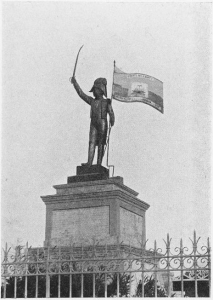“Why would you want to go digging through old dusty notebooks?”, is what my daughter said to me when I told her about my plan to look through the archives at the Schomburg Center for Research in Black Culture to gain material for my Master’s thesis. I explained to her about the necessity of looking at primary sources and how happy I was to be able to do so. The Public Archive posits that their website was “initiated to serve as an accessible clearinghouse of historical essays, archival sources, and informed contemporary journalism on Haiti.” The website aggregates links to digital collections of libraries, open-access online periodicals, academic journals and newspapers.
The site posts information from the historical experience of Haiti along with more contemporary news. As you scroll, you can read interviews with people like Donald Rumsfeld where he discussed the ouster of Haitian president Jean-Bertrand Aristide, and an interview with Sokari Ekine in which she debunks some myths about Haitian people and talks about her involvement in queer community organizing within a country which is staunchly homophobic. While primarily focused on Haiti, the website’s editor also publishes pertinent information of its neighboring country: the Dominican Republic. Interspersed within these current events are posts with information about Haiti’s early history like a speech made by to the Haitian people by their new Commander–in-Chief, Jacques Dessalines, on January 1, 1804.
The most intriguing aspect of the site to me is the extensive blogroll that the editor has collected. Although it is mostly comprised of links to other Haitian intellectual websites, it also has a link to the Digital Library of the Caribbean website. The dLOC is similar to larger sites like WorldCat and ArchiveGrid in that it provides access to digitized versions of Caribbean cultural, historical and research materials currently held in archives, libraries, and private collections.
I think the Public Archive would be better served by a magazine website format to give easier access to its content. Because all of the posts are in a single column, the reader is forced to scroll down past large groups of information to get to a relevant story. Although this format is convenient for mobile users, the lack of categorization of subjects also makes the experience harder. Lastly, I think that the site should expand to include relevant discussions of the Haitian diaspora.



I definitely agree with you about the layout — it gets a little tedious if you are not simply perusing it and you want to find specific information. I know that some sites have both a “desktop” and a “mobile” version, which might be able to help the Public Archive website out. In general, I love the fact that these specific archives are being digitized and that it serves as a sort of hub that leads you to other archives and resources. I think it’s very easy to take for granted that non-White histories are being digitized because we like to think of the internet, in general, as a very “liberal” space, but when so much has been previously destroyed or neglected or downplayed, it’s always beautiful to see these resources preserved and available for everyone.
I also reviewed this site, and I admit, I was definitely more forgiving of the navigational issues on the site. But upon further thought, i need to agree that it’s pretty frustrating. I’ll definitely agree that a magazine type layout would be more accessible and helpful for people using the Public Archive as a source of information.
I thought this was a super resourceful site and enjoyed scrolling through, but completely agree about the layout. It was a little difficult to have to sift through every line of the articles (even the ones not of interest to me) just to see what the next topic would be. It would be better organized through a more condensed layout with different columns that only show excerpts and not entire articles. Good point!
@Farah Thanks for your comment. Archival research can be a lot of fun! You never know what gems you will find 🙂
This is actually pretty interesting. I love the Schomburg, and my older daughter has participated in their Junior Scholars program, which exposes young African American children to Black History in all forms.
The next time I’m in the neighborhood, I will most definitely take a look on their archive on the Dominican Republic. Because, you know. Dominicans.